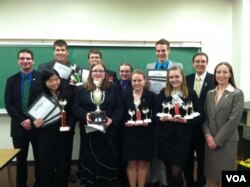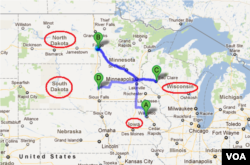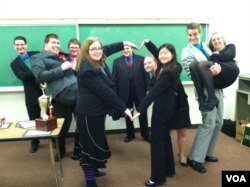“Dear Amorette, thank you for your great help all these days. I have learned a lot from this whole process. Although finally I didn’t manage to get qualified for the national competition this year in Texas, I feel happy to be with this adorable team and to learn so much.”
This Monday morning, the first one since the end of the competition season, I was writing a thank-you letter to the coach of my forensics team. It is hard to say good-bye, especially when it means leaving so many friends and fantastic experiences, and when you feel your journey hasn’t come to a final close.
Let me explain. For the past three months, I have been competing on North Dakota State University’s forensics team. Forensics teams compete in the art of public speaking and debate, and back in China it is a really popular pursuit.
Now you may scream at me: “But you are an international student from China! And you are competing against Americans at speaking in English? Are you kidding me???”
But actually, in China almost every university has its own English forensic team and there are also lots of English debate and speech competitions. Some of them can be as marvelous as those in America. So giving speeches or debating in English is not new for me, and I adapted to the American forensics very well and grew rapidly.
In fact, the biggest thing I had to get over was my own prejudice. I used to hate forensics, regarding the competition as a sort of presumptuous showing off. But I realized that some basic forensic skills could be useful in my daily life, so I decided to try it out.
Now I can acknowledge the power and the leadership I've gotten from it. I used to try my best to get away from politics, while now I’m intrigued by all kinds of sociological analyses and political issues, and I’m looking forward to taking some courses in this field in the near future. I used to be shy and rigid on stage, whereas nowadays I’m at ease facing my audience and more relaxed when giving a public performance. Moreover, I’ve gained better communication skills in my daily life with friends from America and any other countries, with which I’m really proud of myself.
However, I do think there are some big differences between American and Chinese forensics, including differences in the competition itself and people’s attitude towards the meaning of competitions.
The Competition Itself
The most obvious difference that stunned me was the scale of the competitions. I recall that there were more than 50 students competing in a certain forensic competition at my home institution in China, all from that one campus alone. Such a huge number of people contributed to an extremely fierce competition, although it was just a competition simply for this university alone.
On the contrary, in NDSU there are only 9 regular competitors, and we all had to travel from state to state to gather together with competitors from other universities to have a competition.
As a matter of fact, this semester I have already traveled with my team to Iowa, Wisconsin and South Dakota to compete as a representative of NDSU with students from South Dakota State University, Minnesota State University—Mankato, Concordia College, University of Northern Iowa, University of Wisconsin—Eau Claire, Northwestern University and so on.
In fact, I’ve noticed that lots of competitions in America don’t have many people involved compared to what I’m used to in China. I think one piece of it might be that China has such a larger population, so there are more students to compete. And my university in China is much larger than NDSU – about 10,000 more students.
The small size of my team in America has had advantages though. At my home institution, there were so many competitors that the school couldn’t offer training opportunities for each one of them. In fact, most of these simultaneously gathered-together competitors had no training experience before and most of them learned little in this competition due to the lack of individual guidance.
Our team at NDSU has two very professional and devoted coaches: Amorette Hinderaker and Nigel Haarstad, and since our team only has 8 competitors, the two coaches can give each of us very detailed and proper individual instructions. I can see for sure my process, step by step, each step deeply rooted in their instructions.
People’s Attitudes Towards Competitions
Once when being interviewed by NDSU school newspaper, Amorette said that she thought that the individual growth brought about by participating in competitions was more important than actually winning.
Although Chinese today keep saying that process is more important than the result, there are always superfluous applauds and flowers for the winners. “The victor becomes a king and the loser a bandit”(“胜者为王败者寇”) is an ancient Chinese proverb from the feudal age, but it still can be felt in today’s Chinese society sometimes, consciously or not. Lots of Chinese competitors are still coming to compete for the honor, for the attention of the audience, or for a line on their resume.
One interesting contrast, to support this point, is that American forensics competitors get detailed professional comments and suggestions about their performance, while Chinese competitors only get a rank or a grade. In other words, after each round, the Americans can know more clearly about their weaknesses and strengths while the Chinese can only get ranked without knowing what they really need to do in the future.
Another interesting point about the competitions: in the American forensics competitions I’ve been to, the audience is very small and might just be the judges and the other competitors. Yet competitors just go ahead and perform, for they know they are here mainly for their own experience rather than for the audience. In the Chinese competitions, there are always lots of people who aren’t competing for anything themselves watching the performance. It would be awkward for the competitors to have a performance if there were only a very few spectators.
“Amorette, again, many thanks for your devotion to this adorable team and to me, thank you for your care about me. Have a good day.”
When writing this letter, I can’t help reflecting all the competitions I’ve been a part of. From North Dakota to Iowa, to Wisconsin, and to South Dakota, I see a little girl going all the way from being extremely disgusted about politics and speech to getting more active in political participation, cultural communication and emotional expression; from being totally ignorant of the mainstream of the American culture to getting more integrated in this new society; from being shy and egotistic to taking care about others.
How lucky I was to meet this forensic team, and these teammates, at this primary time of my life!
What hobbies or clubs do you participate in? What do you want to know about what those activities are like in the U.S.?






